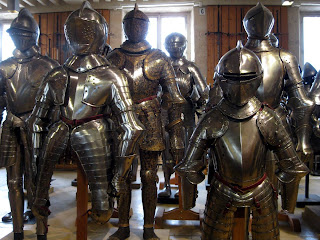This is part of a series examining how the fuels for a fusion reactor are likely to be obtained. In part 1, I described the
Isotopes of hydrogen and named them. In part 2,
Mining deuterium,
we saw how deuterium can be extracted from ordinary water, and brought
up to a concentration of 20 to 25%, and in part 3 we saw how it can be '
vacuum distilled'
to produce 'heavy water' with a purity of 99% deuterium (and a 1%
impurity of protium). Part 4 described how that water can be turned into deuterium
gas by a process called
electrolysis.
The other component of the fuel, namely tritium, is made by a completely different process.
I mentioned previously that tritium is not found in nature in any significant quantities. There is a tiny amount in the upper atmosphere where it is produced by high energy cosmic rays interacting with the gases that are present there. Most of that tritium escapes into space, and the rest decays into
3He (which also then escapes).
It is true that there was a lot more tritium in the atmosphere in the past - particularly in the 1960s when USA and USSR were detonating hydrogen bombs and making a nuisance of themselves to the inhabitants of islands in the Pacific and in desert regions of USA and USSR. Some people estimate that there may have been more than one tonne of tritium in the atmosphere at the time. It is still a tiny quantity.
 |
| Tritium in air, peaked in 1963 |
The surprising thing is that
all of that tritium was man-made in the arms race, using nuclear fission reactors. You can look this up for yourself if you like. I won't dwell on it because it is not the way that tritium is expected to be produced for fusion reactors in the future and therefore I don't care about it very much, except to acknowledge that the tritium used for fusion at the moment comes from a Canadian plant at Darlington in Ontario. There they run a process to remove the tritium from the cooling water of the CANDU reactors. In most CANDU reactors, the tritium is an inconvenient by-product. However, just a few years ago, South Korea proposed building more CANDU reactors specifically in order to make tritium for the
ITER project.
The fusion programme has other plans for the long term though. There is another way to breed tritium and it is one of the greatest benefits of fusion as a future power source. In principle, you can make your own tritium in your fusion reactor, as long as you get the engineering right. That means that you will not have to transport the one and only radioactive material that you need to make fusion work. This is all due to a fortuitous bit of physics. Since all the physics of the production of deuterium seems to go against us, perhaps it is about time that something went the right way!
In the process of nuclear fusion, the heavy isotopes of hydrogen are forced to combine at high temperature. As they fuse together to create helium, they have one neutron to spare. About 80% of the huge amount of nuclear energy released by the reaction is in the kinetic energy of this neutron, and the remainder is in the energy of the helium ion. Neutrons are not constrained by magnetic fields, so they escape from the hot plasma in the reactor, travelling in all directions. The doughnut shaped plasma will be surrounded by a 'blanket' which is designed to stop as many of these neutrons as possible and force them to give up their energy as heat. The heat will generate steam, and the steam will drive turbines to produce electricity.
But the cunning part of the plan is that if this blanket contains a widely available and relatively cheap metal called lithium we get an additional benefit. If you can slow the neutrons down and 'collect' them with lithium, the metallic element gets turned into two gaseous elements, tritium and helium. Hey! Tritium! As if by magic, the fusion process produces part of its own fuel. All you have to supply to the system is fresh lithium (and good technology).
Obviously there is an additional step to the process, to separate the tritium from the helium (which is easy) and from the cooling water, which is a little more complex. However, these aspects of the process are similar to the methods described to separate deuterium from ordinary water.
Each phase in this process has been demonstrated to work, and the ITER tokamak will eventually include a test module to prove the process on an experimental scale. Industrialisation of the whole process is just one of the steps required to make the concept of fusion power into reality, but it is already well beyond the science-fiction stage.
Now one question remains. Is it worth all the energy that is used to make the fuel? Do you get more energy back from nuclear fusion than you put into manufacturing of the fuel.
The answer is affirmative. The cost of the deuterium is trivially small and the indications are that the processing of lithium ore and production of tritium will cost about the same as the fuel for a fossil-fuel power station.
Now we just need to build a full scale fusion reactor!
Read other articles in this series:
Fusion Fuels: Part 1 - The isotopes of hydrogen
Fusion Fuels: Part 2 - 'Mining' deuterium.
Fusion Fuels part 3 - Making 'heavy water'
Fusion fuels 4 - Electrolysis of heavy water




























